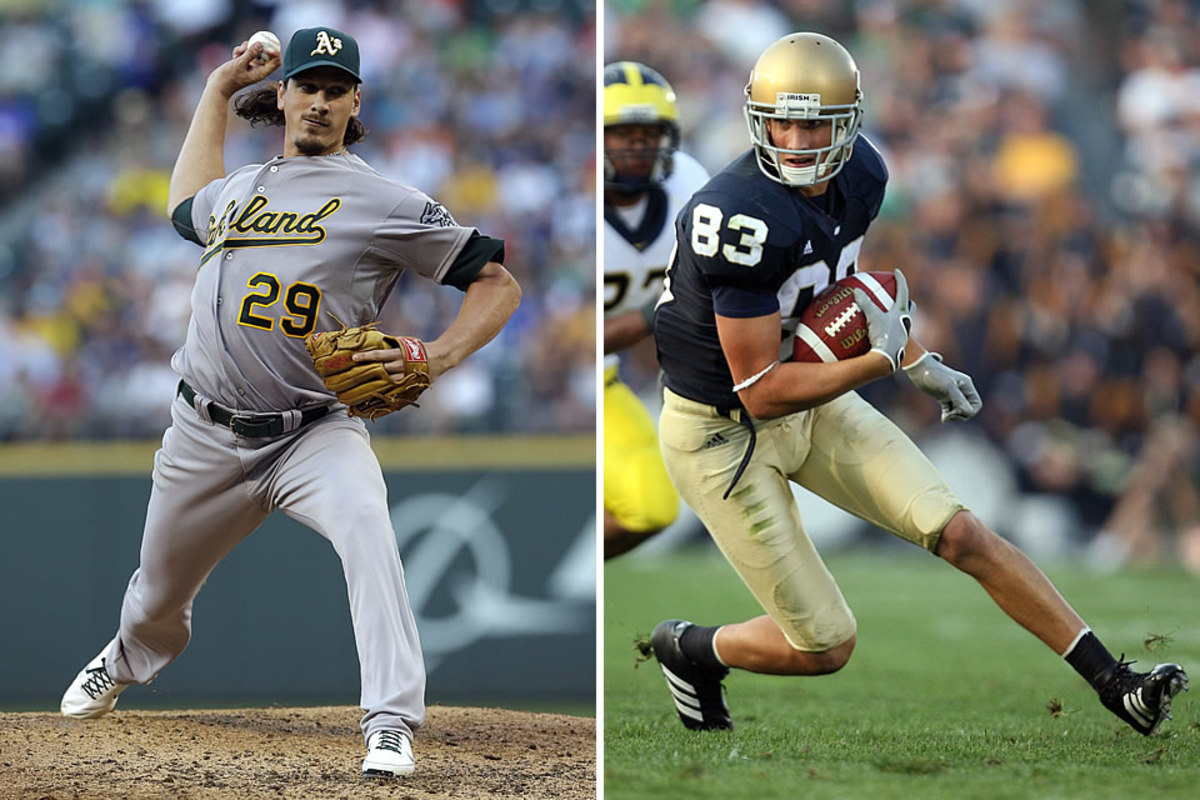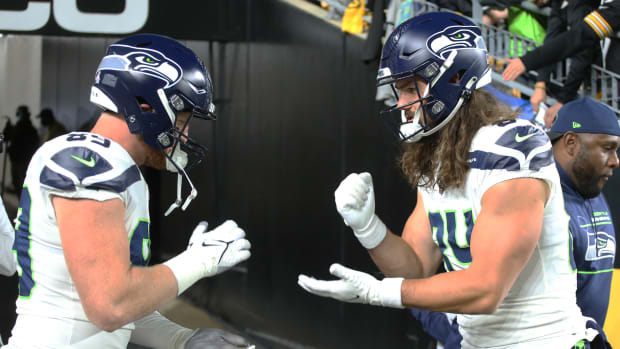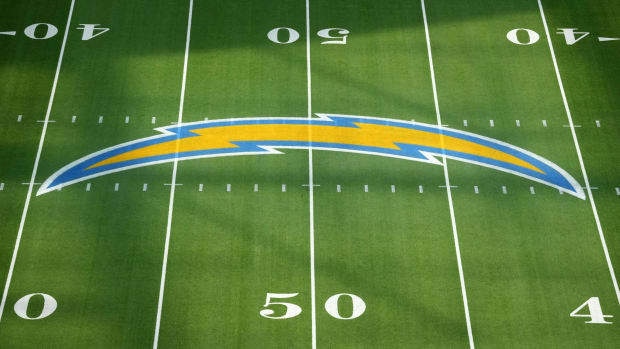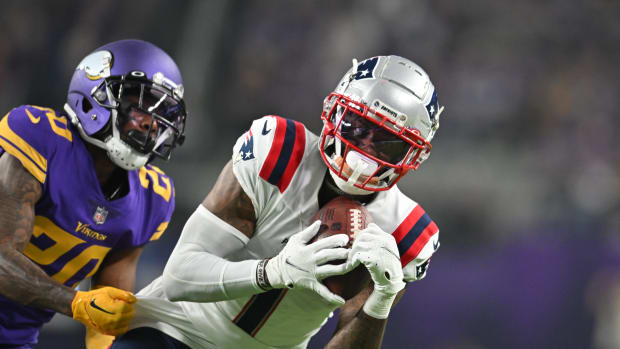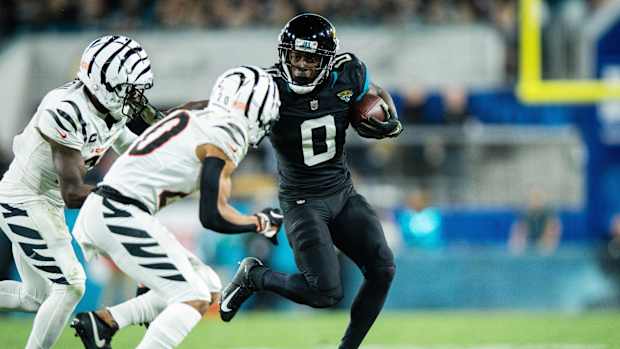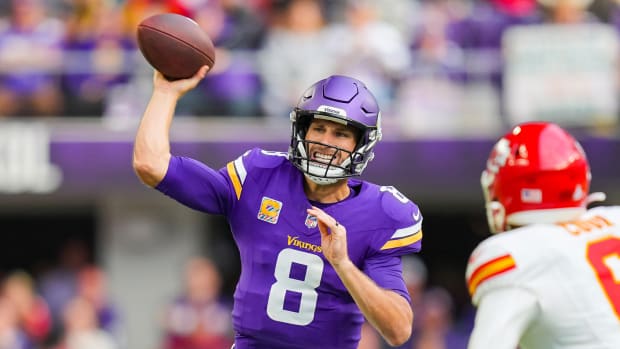The One That Got Away
When was the last time MLB All-Star nomad Jeff Samardzija thought about quitting baseball and coming back to football?
That’s easy. It was April 19, 2010. The former Notre Dame wide receiver had bounced between the minors and the Cubs for the past two seasons with no end in sight. On a Monday night in Queens, Samardzija got the call from the bullpen with two outs in the seventh, trailing the Mets 3–1. He heard the typical taunts from opposing fans during warmups—You should’ve played football!—then took the mound and made his detractors feel pretty good about their assessment.
He walked David Wright, who stole second. Then a slumping Jason Bay doubled off the wall, scoring Wright. Jeff Francoeur reached on an error by third baseman Aramis Ramirez, and just like that Samardzija’s night was over before he recorded an out. That spring he had made the Cubs’ Opening Day roster for the first time, in his fifth pro season, but he was sensing the accomplishment would be rendered moot.
“We got back to the Parker Meridian in the city and I remember calling my agent and being like, I think we need to start setting something up with NFL teams and getting some workouts,” Samardzija says. “I really wasn’t getting much better as a pitcher. The age was getting up on me; I was 25. But he talked me down, told me to sleep on it.
It took Samardzija some time to find his footing in Wrigley Field. (Stephen Green/Sports Illustrated)
“I got back to the field and that love for the game took over and I never really let that thought resurface.”
What might Samardzija, a first-round prospect, have been if he chose football and entered the 2007 draft? The Bears asked that very question as recently as two seasons ago. They had signed Brandon Marshall and were looking for a formidable No. 2 when, according to his agent, they invited the 6-5 Samardzija, then 27 and finishing his first season in the Cubs’ starting rotation, to take in a game at Soldier Field in the owner’s suite. Up until a year ago, teams called agent Mark Rogers (who also represents a former pro baseball player in Seahawks quarterback Russell Wilson) to gauge Samardzija’s interest in the NFL. The answer has always been a respectful no, for several reasons.
First of all, Samardzija got really good at pitching.
Five days after that 6–1 loss to the Mets, digging the Cubs deeper into their annual early-season grave, manager Lou Piniella moved Carlos Zambrano to the bullpen, bumping Samardzija back to the Triple-A Iowa Cubs for a third year in a row. Samardzija made the six-hour drive to Des Moines and pledged to never come back. “It made me learn how to work,” he says. “I eventually got so fed up with being there that I just lived in the weight room and the outfield, running.”
An 11–3 season at Iowa set him up for a promotion to the Cubs when rosters expanded in September. He never went back to Des Moines. After thriving in the Cubs’ bullpen the next year, he’s now in his third season as a full-time big-league starter. His climb has culminated in a selection to the MLB All-Star Game. However, that recognition comes with a caveat; because Samardzija was traded from the NL’s Cubs to the AL’s Athletics on July 4, he’ll be recognized as a National League All-Star but won’t be allowed to compete in the game.
Samardzija’s night was over before he recorded an out. “I think we need to start setting something up with NFL teams,” he told his agent.
Now for the other reason Samardzija never went back to football: He saw what the game was doing to his friends.
Seven Notre Dame players were drafted in 2007. Samardzija would have made it eight had he not signed a five-year, $7.25-million deal with the Cubs in 2006. Of those seven, only one is still in football (Texans tackle Ryan Harris) and five of the other six had their careers shortened or ended by injury. First-rounder QB Brady Quinn missed three weeks with a concussion in 2012 when he was with the Chiefs. Second-round defensive end Victor Abiamari tore his Achilles with the Eagles in 2011 and hasn’t played since. Fifth-round defensive tackle Derek Landri missed part of 2013 with the Bucs with a sprained MCL and hasn’t found a home since being released in February. Seventh-rounder Dan Santucci’s injury-plagued career effectively ended when he went down with a foot injury for the Bengals during the 2009 preseason. And seventh-round safety Chinedum Ndukwe hasn’t played since re-injuring his knee as a Raider in 2011.
Samardzija always felt the risk of arm injury in baseball was the same as bodily injury in football. As a receiver, he knew how to manage the number of hits he would take. But there was more.
“The mentality of the NFL is you’re just not hurt,” he says. “There’s no time to be hurt. It’s different in baseball. It’s more accepted to rest. What my buddies were going through every day in the NFL was unbelievable.”
And they were doing it at the risk of losing their jobs—and paychecks—something baseball and basketball players largely don’t worry about. Rare is the NFL contract that’s guaranteed for longer than a year at a time, a fact Samardzija was aware of as a Notre Dame senior.
“The money was on my mind to an extent,” Samardzija says. “I knew what I was getting myself into with the players union in baseball, which is powerful. I knew it would take longer to be successful in baseball and [that] I had to wait my turn, but I also knew the contract I signed out of college was going to be mine.
“Those football contracts are tough. It’d be nice to see those guys get guaranteed money, and the owners are making enough to do it. It’s pretty impressive to see what players give up and the years they shave off their lives to play a sport they love.”
At 6-5 with tremendous body control, Samardzija was a potential first-round pick in the NFL. He caught 27 touchdowns over his last two seasons at Notre Dame, including this one at USC as a senior in 2006. (Robert Beck/Sports Illustrated)
The risks that come with a life in football were enough of a deterrent. But the real drive came from the commitment he’d made to himself in college: Whichever sport he chose to play professionally, he would not look back. Not to mention the fans at Wrigley and across the nation who peered over bullpen walls and hurled insults at him. (He once used some “unrepeatable words” in response to a heckler in Atlanta and came away “feeling like an idiot.”)
Samardzija heard about his mistaken career choice from Cubs fans until this season, when his ERA dipped from 4.34 in 2013 to one of baseball’s best (currently 2.78, 14th in MLB), prompting talks of a lucrative contract extension. Instead, the rebuilding Cubs traded him to Oakland, putting Samardzija at the front of the rotation for baseball’s best team.
“He wants to win a World Series,” says his older brother and co-agent, Sam. “That’s black and white. With all of the contract talk and speculation, one thing remained constant: He wants to win. He went to Notre Dame to win a national championship and unfortunately fell short. That’s what motivates him.”
So much so that Samardzija had found himself slipping back into glory days while laboring in Chicago. During a road trip in Seattle last summer, he got his hands on a tape of one of his finest college games. As a junior in 2005 he torched the University of Washington secondary in an early season win: eight catches for 164 yards, including a 52-yard TD on a bomb from Quinn. Sitting in the visitor’s clubhouse before the game, he fired up the game film and recited all the play calls on each of Notre Dame’s offensive plays before the ball was snapped. Almost nine years later, he still remembers.
To this day, Samardzija can’t choose between the thrill of going eight scoreless innings and catching 10 passes with a touchdown. He chose baseball for the love of the daily grind, but there will always be that what if.
“Every time a team calls, it’s tough,” he says, “because you realize you’ve lost a step, and you’re getting up there in age, and this is probably the last opportunity.”
































